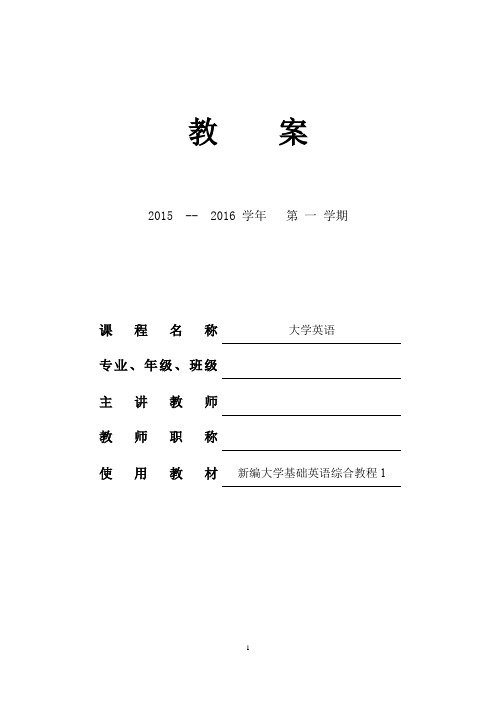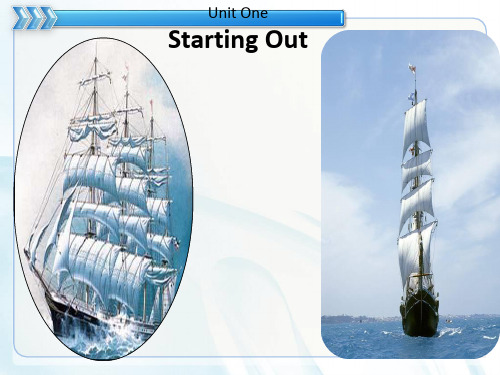大学英语基础教程1册unit1
大学英语基础教程unit1_text_A

Q4. Do you like studying at a college far away from your home? Give reasons for your answer.
Q5. In order to begin your new life at college, what have you bought from home? why did you brought them?
Useful words
survive: vi. 幸存, 活下来; vt. 比…活得长, 经 历…之后还存在; vt. & vi. 幸存;幸免于难; 挺过;艰难度过
e.g. These plants cannot survive in very cold conditions. Most parents expect that their children will survive them.
Group-discussion
Q1. What’s the college life like in your mind before you entered this college?
Q2. How do you feel as a college student now?
Q3. How does college life differ from high school life?
Model:
You’ll survive at your college soon. You’ll also thrive at your college.
Soon you’ll not only survive, but also thrive at your college.
1-1全新版大学英语综合教程第一册 Unit1

全新版大学英语综合教程第一册Unit1Unit 1Growing UpPart I Pre-reading TaskListen to the recording two or three times and then think over the following questions:1. Do you know who John Lennon was?2. Have you ever heard the song before?3. What does Lennon think of growing up? Is it easy or full of adventure s?4. Can you guess what the text s in this unit are going to be about?The following words in the recording may be new to you:monstern. 怪物prayern. 祈祷Part IIText AWhen we are writing we are often told to keep our readers in mind, to shape what we say to fit their tastes and interests. But there is one reader in particular who should not be forgotten.Can you guess who? surprised himself and everyone else when he discovered the answer.WRITING FOR MYSELFRussell BakerThe idea of becoming a writer had come to me off and on since my childhood in Belleville, but it wasn't until my third year in high school that the possibility took hold. Until then I'd been bored by everything associated with English course s. I found English grammar dull and difficult. I hated the assignments to turn out long, lifeless paragraphs that were agony for teachers to read and for me to write.When our class was assigne d to Mr. Fleagle for third-year English I anticipate d another cheerless year in that most tediousof subjects. Mr. Fleagle had a reputation among students for dullness and inability to inspire. He was said to be very formal, rigid and hopelessly out of date. To me he looked to be sixty or seventy and excessively prim. He wore primly severe eyeglasses, his wavy hair was primly cut and primly comb ed. He wore prim suits with necktie s set primly against the collar button s of his white shirts. He had a primly pointed jaw, a primly straight nose, and a prim manner of speaking that was so correct, so gentlemanly, that he seemed a comic antique.I prepared for an unfruitful year with Mr. Fleagle and for a long time was not disappointed. Late in the year we tackle d the informal essay. Mr. Fleagle distribute d a homework sheet offering us a choice of topic s. None was quite so simple-minded as "What I Did on My Summer Vacation," but most seemed to be almost as dull. I took the list home and did nothing until the night before the essay was due(到期的).Lying on the sofa, I finally faced up to the unwelcome task, took the list out of my notebook, and scan ned it. The topic on which my eye stopped was "The Art of Eating Spaghetti."This title produced an extraordinary sequence of mental image s.in Bellevillewhen all of us were seated around the supper table —Uncle Allen, my mother, Uncle Charlie, Doris, Uncle Hal — and Aunt Pat serve d spaghetti for supper. Spaghetti was still a little known foreign dish in those days. Neither Doris nor I had ever eaten spaghetti, and none of the adults had enough experience to be good at it. All the good humor of Uncle Allen's house reawoke in my mind as I recall ed the laughing argument s we had that night about the socially respectable method for moving spaghetti from plate to mouth.Suddenly I wanted to write about that, about the warmth and good feeling of it, but I wanted to put it down simply for my own joy, not for Mr. Fleagle. It was a moment I wanted to recapture and hold for myself. I wanted to relive the pleasure of that evening. To write it as I wanted, however, would violate all the rules of formal composition I'd learned in school, and Mr. Fleagle would surely give it a failing grade. Never mind. I would write something else for Mr. Fleagle after I had written this thing for myself.When I finished it the night was half gone and there was no time left to compose a proper, respectable essay for Mr. Fleagle. There was no choice next morning but to turn in my tale of theBelleville supper. Two days passed before Mr. Fleagle returned the graded papers, and he returned everyone's but mine. I was preparing myself for a command to report to Mr. Fleagle immediately after school for discipline when I saw him lift my paper from his desk and knock for the class's attention."Now, boys," he said. "I want to read you an essay. This is titled, 'The Art of Eating Spaghetti.'"And he started to read. My words! He was reading my words out loud to the entire class. What's more, the entire class was listening. Listening attentively. Then somebody laughed, then the entire class was laughing, and not in contempt and ridicule, but with open-hearted enjoyment. Even Mr. Fleagle stopped two or three times to hold back a small prim smile.I did my best to avoid show ing pleasure, but what I was feeling was pure delight at this demonstration that my words had the power to make people laugh. In the eleventh grade, at the eleventh hour as it were, I had discovered a calling. It was the happiest moment of my entire school career. When Mr. Fleagle finished he put the final seal on my happiness by saying, "Now that(连用有既然之意,但此处非连用), boys, is an essay, don'tyou see. It's — don't you see —Congratulation s, Mr. Baker."(797 words)New Words and Expressionsoff and onfrom time to time; sometimes 断断续续地;有时possibilityn. 可能(性)take holdbecome established生根,确立borevt. make (sb.) become tired and lose interest 使(人)厌烦associatevt. join or connect together; bring in the mind 使联系起来;使联想assignmentn. a piece of work that is given to a particular person(分配的)工作,任务,作业turn outproduce 编写;生产,制造agony▲n. very great pain or suffering of mind or body (身心的)极度痛苦assignvt. give as a share or duty 分配,分派anticipatevt. expect 预期,期望tediousa. boring and lasting for a long time 乏味的;冗长的reputationn. 名声;名誉inabilityn. lack of power, skill or ability 无能,无力inspirevt. fill (sb.) with confidence, eagerness, etc. 激励,鼓舞formala. (too) serious and careful in manner and behavior; based on correct or accepted rules 刻板的,拘谨的;正式的,正规的rigida. (often disapproving) fixed in behavior, view s or method s; strict 一成不变的;严格的hopelesslyad. very much; without hope 十分,极度;绝望地excessivelyad. 过分地out of dateold-fashioned过时的prima. (usu. disapproving) (of a person) too formal or correct in behavior and showing a dislike of anything rude; neat古板的,拘谨的;循规蹈矩的;整洁的primly ad.severea. completely plain; causing very great pain, difficulty, worry, etc. 朴素的;严重的,剧烈的necktien. tie 领带jawn. 颌,颚comic▲a. 滑稽的;喜剧的n. 连环漫画(册)antiquen. 古物,古玩tacklevt. try to deal with 处理,应付essayn. 散文,小品文;论说文distributevt. divide and give out among people, places, etc. 分发,分配,分送finallyad. at last 最终,终于face up tobe brave enough to accept or deal with 勇敢地接受或对付scanv. look through quickly 浏览,粗略地看spaghettin. 意大利式细面条titlen. a name given to a book, film, etc. 标题,题目vt. give a name to 给…加标题,加题目于extraordinarya. very unusual or strange 不同寻常的;奇特的sequencen. 一连串相关的事物;次序,顺序imagen. a picture formed in the mind 形象;印象;(图)像adultn. a fully grown person or animal 成年人;成年动物humorn. 心情;幽默,诙谐recallvt. bring back to the mind; remember 回想起,回忆起argumentn. 论据,论点;争论respectablea. (of behavior, appearance, etc.) socially acceptable可敬的;体面的;文雅的put downwrite down 写下recapturevt. (lit) bring back into the mind; experience again 再现;再次经历relivevt. experience again, esp. in one's imagination再体验,重温violatevt. act against 违背,违反composevt. write or create (music, poetry, etc.) 创作turn inhand in (work that one has done) 交(作业)commandn.,v.命令,指令disciplinen. punishment; order kept (among school-children, soldiers, etc.) 惩罚,处分;纪律what's morein addition, more importantly 而且,此外;更有甚者contempt▲n. 轻视,轻蔑ridiculen. making or being made fun of 嘲笑,嘲弄;被戏弄open-hearteda. sincere, frank诚挚的hold backprevent the expression of (feelings, tears, etc.) 控制(感情、眼泪等)avoidvt. keep or get away from 避免demonstrationn. act of showing or proving sth. 表明;证明careern. 生涯,事业;职业sealn. 印,图章essence▲n. the most important quality of a thing 本质;精髓congratulationn. (usu. pl) expression of joy for sb.'s success, luck, etc. 祝贺,恭喜Proper NamesRussell Baker拉赛尔·贝克Belleville贝尔维尔(美国地名)Fleagle弗利格尔(姓氏)Allen艾伦(男子名)Charlie查理(男子名)Doris多丽丝(女子名)Hal哈尔(男子名,Henry, Harold的昵称)Pat帕特(女子名,Patricia的昵称)。
全新版大学英语综合教程 第一册 Unit 1

Background Information
--- About Italian noodles
• Italian noodles, or pasta is a staple food(主 食) of traditional Italian cuisine. It takes the form of unleavened(未经发酵的)dough made in Italy mostly of durum wheat (硬粒小 麦), water and sometimes eggs. Pasta comes in a variety of different shapes that serve for both decoration and to act as a carrier for the different types of sauce.
A problem-solution B cause-effect C general-specific D time / chronological sequence
问题-解决(问答) 因果 概括-具体 时间 顺序
• Scan the text, try to find out all the time words, expressions and clauses.
Text A Writing for myself
Contents
Warm-up
Background information Language study After-reading activities
Warm-up
What was your impression of your first English teacher in your life? Do you like him/her? Why or why not? Think of a word to describe him/her.
新编大学基础英语综合教程第一册教案

教学方式、手段、媒介:
教学方式(Teaching method):
1. lecture
2. role play
讨论、思考题、作业:
1. Organize the students into groups to complete theinformationfor your group members as well as yourself, which may include:
Then ask one student from each group to report the results of their interview.
efulExpressions:*
1) at a wedding
2) at a disco
3) on holiday
4) be/come from
5) hi, there
6) date of birth
7) in lower case
8) in capitals
2. Language Focus on?
Reading
Understand short texts describing jobs and morning routines and read a snack bar menu.
Language quality
Use determiners and possessive pronouns, the Present Simple.
2. Assign the exercise after the text.
新版大学英语综合教程第一册Unit1精品PPT课件

• Sadly John Lennon _n_ev_er_d_i_d _liv_e__ to see his son grow up; Lennon was killed by a mad man when his son was still only_f_iv_e_ye_a_rs_o_ld_ .
• The group consisted of John Lennon (rhythm guitar, vocals), Paul McCartney (bass guitar, vocals), Ringo Starr (drums, vocals) and George Harrison (lead guitar, vocals) .
Part Division
Parts
1 2 3
Para(s) 1-2
3-56-9MaFra bibliotekn Ideas
Baker was bored by everything associated with English courses, including his new English teacher.
Baker found himself attracted by one particular topic and wrote about it for his own enjoyment.
Global Reading
• since my childhood in Belleville (Para. 1) • until my third year in high school (Para. 1) • until then (Para. 1) • when our class was assigned to Mr. Fleagle for third-year
全新版大学英语综合教程一册Unit1Growingup

• possibility: state of being possible; (degree of) likelihood (usu. followed by that-clause or of)
• 5. tedious: boring and lasting for a long time
• Examples: 1) The movie was so tedious that many viewers left before it was over.
•
2) Laura found George to be tedious and decided not
• 2. Until then I'd been bored by everything associated with English courses.: Up to then I had lost interest in things related to English courses.
• bore: make (sb.) feel tired and lose interest
•
2) Jim Kerry has quite a reputation for beinll (sb.) with confidence, eagerness, etc.
• Examples: 1) Martin Luther King, Jr.'s speeches inspired people to fight for equal treatment of African Americans.
大学英语综合教程1(第二版)Unit1详解

Main idea
Structural analysis
Main idea
1. What is the story narrated in the text about?
The story told by the author is about how his _g_ra_n_d_f_a_t_h_e_r, with his o__w_n__li_fe__e_x_p_e_r_ie_n_c_e_ , helped him to o__ve_r_c_o_m__e_t_h_e__s_a_d_n_e_ss_ he felt when he was about to l_e_a_v_e__h_is__o_ld__h_o_u_s_e_ , and opened his eyes to the truth of his advice that one should n__e_v_e_r _s_a_y_g_o_o_d_b_y_e_ to those who were dear to him.
Mom: You’re angry about the move. I get that. Just what are you expecting your silent protest will get you? … At least acknowledge this isn’t the way to deal with your anger the way you said you were gonna do. Say yes with your head. Two blinks. … Nothing. [sigh] Mal, you and Simon take your stuff. Wait in the foyer while I go look for the main circuit breaker.
新标准大学英语第一册综合教程unit 1-1-1

lift
tube / underground hall of residence
Words & Phrases
residence
所;住宅
n. [C] (fml)
1) a person's home; the place where someone lives 住
2) the official house of a government minister or other public and official figure 官邸;公馆
American and British English
Year of study First year Second year British Expression American Expression freshman sophomore junior senior
first-year student / fresher (in first months of study)
2) n. a small mouthful of liquid 一小口 e.g. take a sip of water 喝一小口水 cf. gulp v. & n. 狼吞虎咽 / 一大口
Words & Phrases
intelligent
Word family:
adj.
intelligently ad. intelligence n. e.g. 1. A person who quickly learns and understands has good intelligence. 智力;理解力 2. Is there, somewhere out in space, intelligent life trying to speak to us? 有智力的;聪明的
- 1、下载文档前请自行甄别文档内容的完整性,平台不提供额外的编辑、内容补充、找答案等附加服务。
- 2、"仅部分预览"的文档,不可在线预览部分如存在完整性等问题,可反馈申请退款(可完整预览的文档不适用该条件!)。
- 3、如文档侵犯您的权益,请联系客服反馈,我们会尽快为您处理(人工客服工作时间:9:00-18:30)。
请留意他的最新影片,该片将在下月放映。
Language Points
7. Anyone can create a website, so you cannot always be sure the information is correct.
create v. make something new, especially to invent something 创造
keep away from: not go somewhere or near something, or prevent someone from going somewhere or near something 远离
eg: Keep away from the edge of the cliff. 远离悬崖边。
Background Information
Internet is composed of many interconnected computer networks. Each network may link tens, hundreds, or even thousands of computers, enabling them to share information with one another. Internet has made it possible for people all over the world to communicate with one another effectively and inexpensively. Internet has also brought new opportunities to government, business and education.
a time. 你让他无从理解!慢慢同他说,一次说一件事。 2) mix up two separate things or people in one’s mind,
imagining that they are one 混淆 eg: It’s easy to confuse his films, because he tends to use
“当心!”他大声喊道,可是太迟了——她已经将 整盒的饮料摔到地上。
2) be careful to notice someone or something
interesting 留意
e.g. Watch out for his latest movie, which comes out next month.
受人喜欢的
e.g. That song was popular with people from my father’s generation.
那首歌深受我父亲那代人的欢迎。
Language Points
5. You just need to type in some information about what you want to find.
Language Points
1. The word “Internet” describes the network that started in 1983.
describe v. say or write what someone or something in like 描述
e.g. He described the painting in detail.
connect v. join or be joined with something else 连接
e.g. Can I connect my printer with something else?
我能把打印机连到你电脑上吗?
Language Points
share v. 1) have or use something at the
祖父有时候很糊涂,他甚至不知道是星期几。
2) nor clear and therefore difficult to understand 迷惑的 eg: Your essay gets a bit confused halfway through when
Language Points
8. …never answer messages that make you feel confused or uncomfortable…
confuse v. 1) mix up someone’s mind or ideas, or make
something difficult to understand 混乱,难以理解 eg: You’re confusing him! Tell him slowly and one thing at
the same actors. 很容易将他电影搞混淆,因为他常使用相同的演员。
Language Points
confused adj.
1) unable to think clearly or to understand something 糊涂的
eg: Grandfather gets quite confused sometimes, and doesn’t even know what day it is.
same time as someone else 共用 e.g. Bill and I shared an office for
years. 比尔和我共用一间办公室多年。
2) divide food, money, goods, etc. and give pa) let someone have or do whatever they want even if it is bad for them 放纵,纵容,迁就
eg: My aunt indulges the children dreadfully. 我姑妈太纵容孩子了。
Language Points
type v. write with a computer 电脑输入
e.g. She asked me to type a couple of letters.
她让我在电脑上打几封信。
Language Points
6. But watch out when you use information from the Internet.
e.g. The Bible says that God created the world. 圣经上说,上帝创造了世界。 e.g. He created a wonderful meal from very few
ingredients. 他用了很少的配料就做出了非常不错的一顿饭。
Background Information
Today, Internet is the most popular means for people in far distance to communicate with each other. But some people, especially teenagers, like to play online games, which may not only affect their studies, but also do harm to their health. Therefore, we should know how to use Internet for the purpose of our study and research, and how to balance our study and online games.
9. …how to make good use of the net, and how to keep away from the websites they should not look at.
make use of : use something that is available 利用某物 eg: We might as well make use of the hotel’s facilities. 我们不妨好好利用一下旅馆的设施。
watch out:
1) used to warn someone of danger or an
accident that seems likely to happen 当心, 注意危险
e.g. “ Watch out!” he shouted. But it was too late --she had knocked the whole tray of drinks on the floor.
e.g. Many towns and cities have cybercafes where you can surf the Inernet.
许多城镇和城市都有网吧,人 们可以在里面尽情上网浏览。
Language Points
4. If you don’t know the address, go to a popular search engine like Google.
他详细描述了那幅画。 e.g. Let me describe ( to you ) how it
happened. 让我向你描述事情是如何发生的。
Language Points
2. The Internet connects computers from around the world for people to share information.
Language Points
8. ...bad things can easily happen if young people indulge in the Internet.
